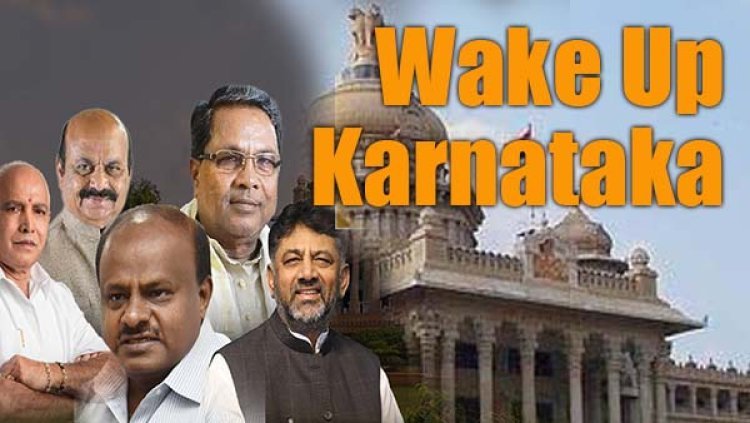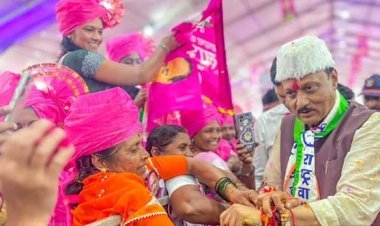A decisive defeat in Karnataka will begin BJP’s exit from south India, decide 2024 roadmap
This is not just about Karnataka. The political contest in the state would set the tone and tenor of the battle to reclaim our republic.

Yogendra Yadav :
On 10 May, we will witness the general election to the legislative assembly of Karnataka. But that is officialese. In reality, this is not going to be just an election. This is not just about who rules the state for the next five years. This is not just about Karnataka. The political contest in the state would set the tone and tenor of the battle to reclaim our republic.
This assessment is not the usual lazy quip about the state assembly elections in the run-up to the Lok Sabha polls being the proverbial “semi-final”. Clearly, a mid-sized south Indian state cannot settle the Lok Sabha election, nor be the barometer for public mood in north and west India where the BJP sweeps Lok Sabha polls. Arguably, what happens in December in Madhya Pradesh, Rajasthan and Chhattisgarh would have a greater bearing on the parliamentary polls than this state election a year before the big one. Yet Karnataka is the critical battle that would settle the political trajectory for the next year.
Seeking power and legitimacy
For the BJP, it’s the battle to validate its hegemony, both in terms of power and legitimacy. Karnataka matters directly for the Lok Sabha tally of the BJP. As I have pointed out earlier, the BJP has reached saturation point in the areas of its dominance. The ruling party has very little room to make up for the losses it is bound to face in several states in 2024. If it loses even half of the 26 (including the seat won by the independent supported by the party) seats it won in Karnataka in 2019, there is nowhere in the country (except partly Telangana) where it can hope to add to its existing tally and make up for these losses. It must retain its hold over Karnataka.
Besides, the logic of dominance goes beyond numbers. Having built an aura of invincibility, it cannot afford to lose a major election, especially in a state where it is the incumbent. It faces a tough task, as the Bommai-led BJP government is widely perceived to be both incompetent and corrupt, besides being brazenly communal. The success of the “40 per cent sarkara” campaign — a reference to the official protest by the state contractors’ association against a 40 per cent kickback to the government for any state-funded infrastructural projects — is a testimony to how poorly this government is viewed in Karnataka. Yet the BJP leadership is confident that they can neutralise the ‘image issue’ with clever social engineering, communal polarisation and pots of money. The BJP understands its stakes. The PM has already visited the state seven times before the announcement of the polls.
The BJP desperately seeks legitimacy in Karnataka. Despite ruling the state several times, the BJP has never won a majority of seats in any assembly election in Karnataka. It must do so now, if only to redeem the legitimacy of its governance by stealth through multiple renditions of its dubious ‘Operation Kamala’. Karnataka was the BJP’s door to south India and was presented as an opportunity to shed the tag of being a north Indian import. More than three decades after its initial breakthrough in the wake of Advani’s rath yatra, the BJP awaits a clear popular mandate in its favour to enter other states in the south. The BJP government has openly used communal pitches to legitimise its regime. It needs to prove that issues like Hijab and Azan are enough to drown everyday issues of governance and economic conditions of the people.
Congress’ stakes and challenges
The stakes are much higher for the Congress. Karnataka is one of the few states in the country where the Congress is still entrenched, has leaders with a genuine mass following and workers in every nook and corner. With the new party president being from the state, there is an added element of prestige to this electoral battle. If it cannot defeat a weak BJP leadership in this state, there would be question marks on its capacity to recover its political base in the rest of the country. If the Congress is in no position to substantially add to its existing tally of one Lok Sabha seat in the state it swept even after the Emergency, it would be hard to press claims of a Congress resurgence in the country.
The Congress desperately needs to win this election. Having lost the Maharashtra government, the resource-starved opposition needs at least one well-off state where deep pockets are not mortally scared of funding the opposition parties. Currently, Karnataka is the only possibility. In political terms, Karnataka is a test case for Congress revival. The widespread appreciation for the Bharat Jodo Yatra has always invited questions: can this translate into votes? Would the momentum be maintained? Will Rahul Gandhi throw himself into an election campaign the way he did in the Yatra? The polls in the northeastern states were not seen as the test case. But Karnataka cannot be treated as an exception. Not after Rahul Gandhi started a frontal attack on ‘Modani’. Not after Rahul Gandhi’s disqualification. The battle lines are drawn. And by design or default, Karnataka is the battleground.
The Congress faces multiple challenges. A simple defeat of the BJP won’t do. Given the past record of the Janata Dal (Secular), a hung assembly could well mean another BJP government or a JDS Chief Minister controlled by the BJP. The Congress needs a clear and comfortable majority, at least 125 seats in the 224-member assembly, to ward off the possibility of a BJP-JDS coalition or another Operation Kamala. Given that the BJP gets more seats for its votes in Karnataka (last time it trailed Congress by two percentage points votes but won 24 more seats), the Congress needs at least a six percentage points lead over the BJP. That’s more than what some of the recent polls have shown. The Congress cannot take things for granted. It needs to give a big final push in the next six weeks.
The Congress has already made a good beginning with four carefully chosen electoral promises: Gruha Jyoti (200 units of free electricity); Gruha Lakshmi (Rs 2,000 per month for women head of household); Anna Bhagya (10 kg rice per month to BPL cardholders) and Yuva Nidhi (Rs 3,000 per month for unemployed youth with graduation degrees). It could add something for the farmers, ideally respond to their long-standing demand for an MSP guarantee. It must find ways to respond to the BJP’s cynical last-minute move to grant 2 per cent additional reservation to the two dominant communities of Lingayats and the Vokkaligas. It must effectively mobilise the bottom two-thirds of the social pyramid in Karnataka comprising OBCs, SC, ST and minorities. It cannot take Muslims for granted, given the presence of JDS, possible vote splitting by AIMIM and SDPI, and the unease in the Muslim community over the way elected Congress MLAs joined the BJP last time. And the Congress must settle its internal contradictions. Rahul Gandhi must intervene effectively in Karnataka in order to preserve and build on the gains of the Bharat Jodo Yatra.
Positive politics
This election is going to be the test case for civil society as well. For the first time, a large number of civil society groups comprising organisations of farmers, Dalits and minorities as well as democratic and secular organisations and intellectuals in the state have come together under the banner of Yeddelu Karnataka (Wake Up Karnataka) to intervene in the upcoming elections so as to ensure the defeat of the BJP. (Bharat Jodo Abhiyan and Swaraj India, to which I belong, are associated with this initiative). For the first time, these organisations have decided to go beyond just issuing statements and holding a few public meetings. They have chalked out a plan of placing foot soldiers in select constituencies, speaking to people about real issues and exposing the lies of the RSS-BJP combine. And they have decided not just to oppose the BJP but to support the candidate best placed to defeat the BJP.
On 13 May, we shall find out not just the outcome of an election. Under the present dispensation, no election is just an election, it is about popular endorsement of its politics of lies and hatred. If the “40 per cent sarkara” tag sticks to the Bommai government, it would pressure the Narendra Modi government on the Adani issue. If Karnataka rejects decisively the politics of bigotry symbolised by the controversies orchestrated around Hijab, Azan, ‘love jihad’ and vigilante mobs, that opens the way for positive politics in 2024. A decisive defeat in Karnataka could be the beginning of the BJP’s exit from south India. Above all, a defeat for the BJP would intensify the political battle on the streets to reclaim democratic spaces, the battle that has just begun after Rahul Gandhi’s disqualification. It would decide the roadmap for 2024. The stakes could not get higher.

















